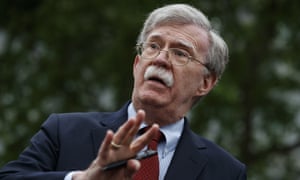Managers urge senators to call John Bolton as a witness, but the defense argued that calling witnesses could draw the trial out

Photograph: Evan Vucci/AP
The eighth full day of Donald Trump’s impeachment trial in the US Senate has concluded. Here are five key takeaways:
Witnesses in doubt
While impeachment managers led by Adam Schiff, the intelligence committee chair, urged senators to call former national security adviser John Bolton as a witness at the trial, the few Republican senators who might be open to that gave no new indication that they would vote in favor of witnesses.
Trump’s defense team argued, meanwhile, that calling witnesses would change “the nature and scope of the proceedings” and could lead to court challenges that would draw the trial out. Schiff challenged the point, but Republicans aimed to end the trial after only two weeks.
Actual debate
After a week of siloed opening statements, the format of Wednesday’s session – with lawyers getting five minutes to reply to questions posed by senators in writing – allowed for the two sides to engage in debate almost immediately on contested points.
When Trump’s team asserted that the president withheld aid to Ukraine out of concern for corruption, the House managers pointed out that Trump never expressed concern about corruption in Ukraine until Joe Biden announced a presidential bid. And when Trump’s team said the House did not seek Bolton’s testimony, Schiff corrected them.
Elsewhere, the two sides clashed over whether impeachment must be based on an underlying criminal offense, and whether House subpoenas of the executive branch were valid.
Roberts’ role
Presiding at the trial, chief justice John Roberts was not called on to make significant rulings about permissible questions or testimony – with one exception: Roberts reportedly informed senators, behind the scenes, that he would not take a question posed by Rand Paul of Kentucky that named the whistleblower whose complaint launched the impeachment inquiry.
“We agree to be bound by the chief justice,” Schiff said, urging a move to call witnesses. “We will not seek to appeal an adverse ruling. Will the president’s counsel do the same? … They’re afraid he’ll be fair… that should tell you something about the weakness of their position.”
Debate over timeline
Schiff said Trump’s team was arguing against witnesses by threatening to draw out the trial indefinitely. “If you dare to want witnesses in a trial,” Schiff paraphrased the defense as saying, “we are going to make you pay for it with endless delay.”
Schiff argued that Roberts, “a perfectly good chief justice”, could make fast rulings that would prevent the testimony of Bolton or others from creating a lengthy detour in the trial.
Aggressive Dershowitz defense
Early in the session, Trump attorney Alan Dershowitz erected an extremely broad defense of Trump’s conduct, arguing that if a president thinks his reelection is good for the country, that president cannot be impeached for using his power to promote his own reelection, because by definition the president would be acting on behalf of the country, in his own eyes.
“If a president does something which he believes will help him get elected in the public interest, that cannot be the kind of quid pro quo that results in impeachment,” Dershowitz said.
ABC News
(@ABC)Trump attorney Alan Dershowitz: “If a president does something which he believes will help him get elected in the public interest, that cannot be the kind of quid pro quo that results in impeachment.” https://t.co/jKErQcS1Iy pic.twitter.com/zo4rL6Zbla
January 29, 2020
Source: US Politics - theguardian.com



